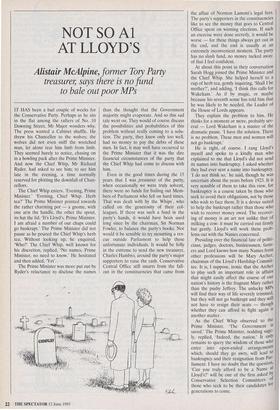NOT SO Al AT LLOYD'S
Alistair McAlpine, former Tory Party
treasurer; says there is no fund to bale out poor MPs
IT HAS been a bad couple of weeks for the Conservative Party. Perhaps as he sits in the flat among the rafters of No. 10 Downing Street, Mr Major wonders why. The press wanted a Cabinet shuffle. He threw his Chancellor to the wolves; the wolves did not even sniff the wretched man, let alone tear him limb from limb. They seemed barely to notice, chasing on in a howling pack after the Prime Minister. And now the Chief Whip, Mr Richard Ryder, had asked to see him; to see him late in the evening, a time normally reserved for plotting the downfall of Chan- cellors.
The Chief Whip enters. 'Evening, Prime Minister."Evening, Chief Whip. Herb tea?' The Prime Minister pointed towards the rather charming pot — a gnome, with one arm the handle, the other the spout, its hat the lid. 'It's Lloyd's, Prime Minister. I am afraid a number of our chaps could go bankrupt.' The Prime Minister did not pause as he poured the Chief Whip's herb tea. Without looking up, he enquired, 'Who?' The Chief Whip, well known for his discretion, replied, 'No names, Prime Minister, no need to know.' He hesitated and then added, 'Yet'.
The Prime Minister was more put out by Ryder's reluctance to disclose the names than the thought that the Government majority might evaporate. And so this sad tale went on. They would of course discuss the possibilities and probabilities of this problem without really coming to a solu- tion. The party, they knew only too well, had no money to pay the debts of these men. In fact, it may well have occurred to the Prime Minister that it was the dire financial circumstances of the party that the Chief Whip had come to discuss with him.
Even in the good times during the 15 years that I was ,treasurer of the party, when occasionally we were truly solvent, there were no funds for bailing out Mem- bers of Parliament who fell on hard times. That was dealt with by the Whips', who called on the generosity of their col- leagues. If there was such a fund in the party's hands, it would have been used long since by the chairman, Sir Norman Fowler, to balance the party's books. Nor would it be sensible to try mounting a res- cue outside Parliament to help these unfortunate individuals. It would be folly in the extreme to send the new treasurer, Charles Hambro, around the party's major supporters to raise the cash. Conservative Central Office still smarts from the fall- out in the constituencies that came from the affair of Norman Lamont's legal fees. The party's supporters in the constituencies like to see the money that goes to Central Office spent on winning elections. If such an exercise were done secretly, it would be worse — for these things always get out in the end, and the end is usually at an extremely inconvenient moment. The party has no slush fund, no money tucked away: of that I feel confident.
At about this point in their conversation Sarah Hogg joined the Prime Minister and the Chief Whip. She helped herself to a cup of herb tea, gently inquiring, 'Shall I be mother?', and adding, 'I think this calls for Wakeham.' As if by magic, or maybe because his seventh sense has told him that he was likely to be needed, the Leader of the House of Lords appears.
They explain the problem to him. He thinks for a moment or more, probably sev- eral — Lord Wakeham is a master of the dramatic pause. 'I have the solution. There is no problem. These men and women will not go bankrupt.'
He is right, of course. I rang Lloyd's myself and spoke to a kindly man who explained to me that Lloyd's did not send its names into bankruptcy. I asked whether they had ever sent a name into bankruptcy. 'I do not think so,' he said, though he was uncertain about the years before 1923. It is very sensible of them to take this view, for bankruptcy is a course taken by those who seek to avoid their obligations, not by those who wish to face them. It is a device suited to help the bankrupt rather than those who wish to recover money owed. The recover- ing of money is an art not unlike that of milking a cow: it must be carried out firmly but gently. Lloyd's will work these prob- lems out with the Names concerned.
Presiding over the financial fate of politi- cians, judges, doctors, businessmen, farm- ers and Lord knows how many Names from other professions will be Mary Archer, chairman of the Lloyd's Hardship Commit- tee. It is, I suppose, ironic that the Archer to play such an important role in affairs that might easily affect the course of our nation's history is the fragrant Mary rather than the pushy Jeffrey. The unlucky MPs will find their way of life severely trimmed, but they will not go bankrupt and they Will not have to resign their seats — though whether they can afford to fight again Is another matter.
As the Chief Whip observed to the Prime Minister, 'The Government is saved.' The Prime Minister, nodding sage- ly, replied, 'Indeed, the nation.' It only remains to query the wisdom of those who enter into open-ended arrangements which, should they go awry, will lead to bankruptcy and their resignation from Par- liament. I have no doubt that the question, 'Can you truly afford to be a Name at Lloyd's'?' will be one of the first asked by Conservative Selection Committees of those who seek to be their candidates for generations to come.


































































 Previous page
Previous page